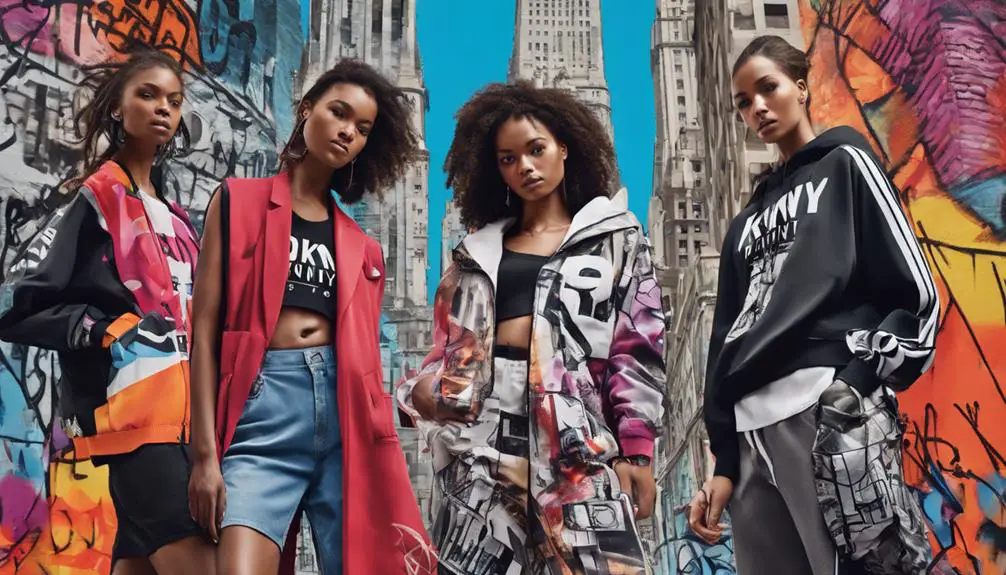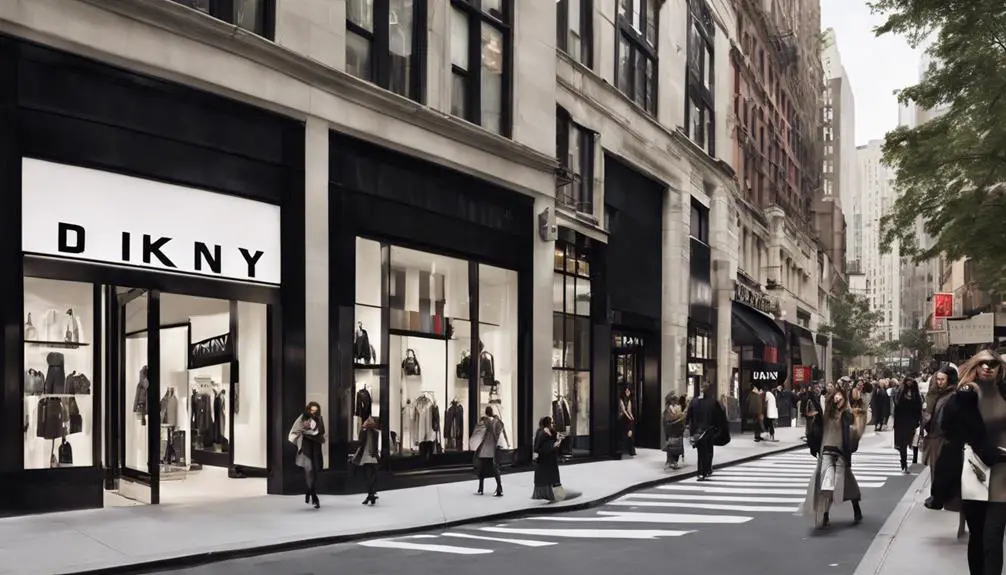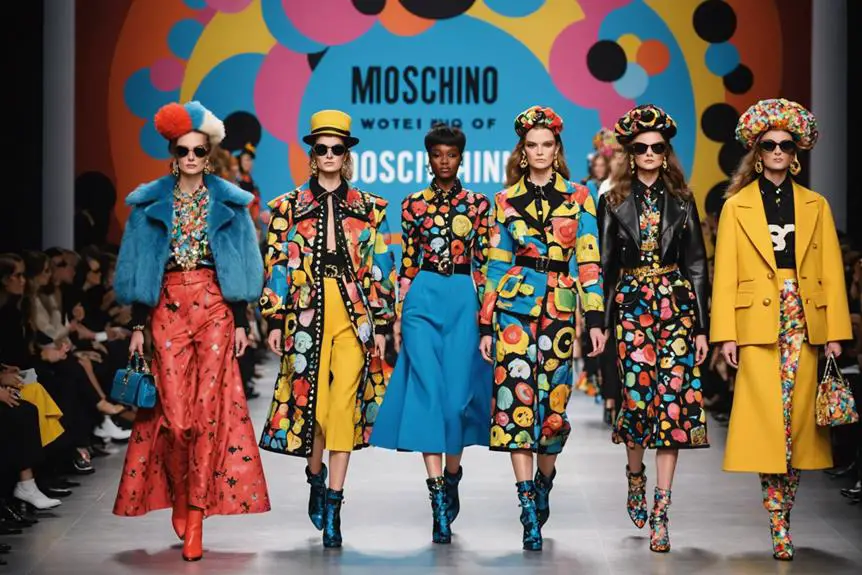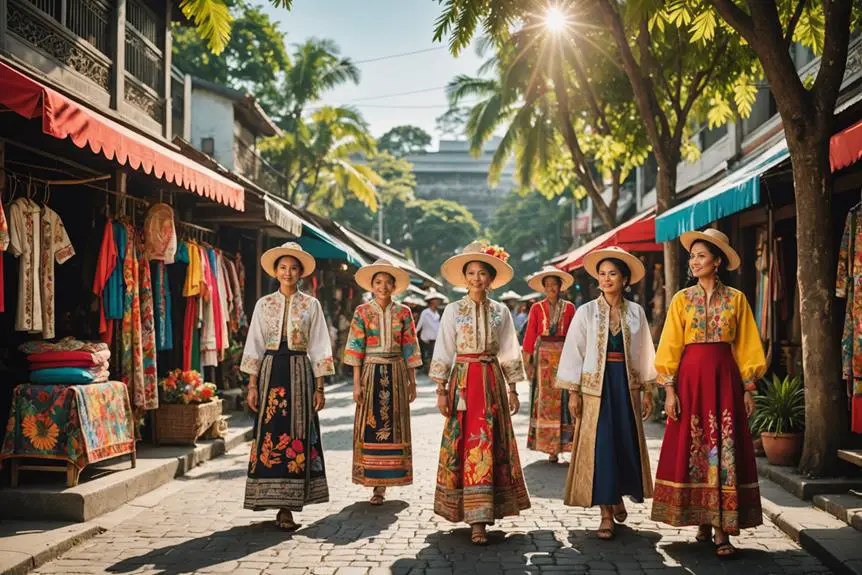DKNY stands for "Donna Karan New York," named after its founder, Donna Karan, who created the brand in 1984. It captures the essence of New York City's vibrant lifestyle. DKNY is known for its stylish and versatile clothing, designed for modern urban living. The brand gained fame with its "Seven Easy Pieces" concept, promoting interchangeable outfits. Not only does it embrace inclusivity and body positivity, but it also focuses on sustainability in production. Over the years, DKNY has expanded into menswear, fragrances, and more, influencing global fashion trends. There's much more to uncover about its impact and evolution!
DKNY Brand History

DKNY, short for Donna Karan New York, burst onto the fashion scene in 1984, capturing the vibrant essence of New York City's culture. Founded by designer Donna Karan, the brand aimed to reflect the city's dynamic lifestyle through stylish, functional clothing.
It didn't take long for DKNY to stand out, especially with the introduction of its first mainline collection, "Seven Easy Pieces," in 1985. This collection emphasized versatile, interchangeable clothing that made getting dressed feel effortless for women. The brand's approach to fashion was similar to that of other iconic labels, such as Calvin Klein's evolution from coats and dresses to a complete line of women's sportswear.
As the years rolled by, DKNY expanded beyond just women's apparel. You might be surprised to learn that it ventured into menswear, fragrances, and even home collections. The brand also gave birth to sub-brands like DKNY Jeans and DKNY Active, catering to a wider audience.
In 2001, the luxury goods conglomerate LVMH acquired DKNY, further solidifying its status in the high-fashion world. Then, in 2016, the brand changed to new ownership under G-III Apparel Group for a whopping $650 million.
After Donna Karan's retirement, DKNY evolved its creative direction under new designers Maxwell Osborne and Dao-Yi Chow. They redefined the brand's identity while staying true to its roots.
Today, DKNY stands as a symbol of modern, urban fashion, blending comfort and style seamlessly, just like the bustling city it represents.
Significance of DKNY
In today's fast-paced world, many appreciate how DKNY captures the essence of urban life through its fashion. Founded in 1984 by designer Donna Karan, this iconic fashion house embodies the vibrant spirit of New York City. DKNY's collections are designed for modern women who juggle busy lives while still wanting to express their unique style. Each piece reflects the practicality and sophistication that urban living demands, making it a go-to choice for those seeking functional yet stylish apparel.
Additionally, vintage DKNY pieces, especially those with distinctive tag characteristics, hold considerable historical value and authenticity, further enriching the brand's legacy.
Moreover, DKNY stands out for its commitment to inclusivity and body positivity. The brand empowers women to embrace their individuality, ensuring that everyone can find something that resonates with their personal style. This focus helps you feel confident and celebrated in your fashion choices, no matter your body type.
Additionally, DKNY takes social responsibility seriously. With a growing consumer demand for eco-friendly fashion, the brand practices sustainability and ethical production methods. This dedication not only reflects a commitment to the environment but also aligns with the values of many modern consumers.
Over the years, DKNY has considerably influenced American fashion, reinforcing New York City's status as a global fashion capital. By setting trends that resonate in urban markets worldwide, DKNY continues to shape the landscape of contemporary fashion.
DKNY's Cultural Impact

Fashion isn't just about clothing; it's a reflection of culture, and DKNY has played a significant role in shaping that narrative. Founded in 1984, this iconic brand captures the essence of New York's vibrant culture and urban lifestyle. It's not just about looking good; it's about feeling empowered and embracing who you are.
Here are three key ways DKNY has made an impact:
- Promoting Body Positivity: DKNY has been at the forefront of advocating for body positivity, encouraging women of all shapes and sizes to express themselves through fashion. This commitment allows everyone to find their style, making fashion more inclusive.
- Influencing Global Trends: By merging functionality with modern aesthetics, DKNY's collections resonate with a diverse demographic. They reflect the fast-paced nature of city life while setting trends that extend far beyond New York.
- Championing Social Causes: DKNY's philanthropic efforts, particularly in women's empowerment and health initiatives, enhance its cultural relevance. The brand uses its platform to support meaningful causes, showing that fashion can be a force for good.
In a world that often tries to box people in, DKNY stands out as a beacon of individuality and inclusivity. Its influence on New York fashion and beyond inspires emerging designers and sets a standard for what modern fashion should represent: unity, diversity, and empowerment.
DKNY Product Lines
There's something for everyone in DKNY's diverse product lines, which cater to the contemporary urban lifestyle.
Whether you're looking for stylish apparel or trendy accessories, DKNY has you covered. The brand offers a wide array of options for both men and women, making it a go-to choice for those who appreciate street style infused with New York City's vibrant energy.
One of the standout lines is DKNY Jeans, focusing on denim-based fashion that effortlessly blends comfort and style.
If you prefer a more active look, DKNY Active emphasizes sporty and athleisure wear, perfect for those who want to stay stylish while on the move.
But it doesn't stop there. DKNY Beauty, launched in 1992, specializes in fragrances that capture the essence of New York City, appealing to a broad consumer base.
You can find scents that evoke the hustle and bustle of urban life, making them a unique addition to your everyday routine.
DKNY's collections often feature versatile and interchangeable pieces, allowing you to create a cohesive wardrobe that reflects modern urban living.
Plus, the brand's commitment to sustainability shines through its use of eco-friendly materials and ethical production practices, ensuring you can feel good about your fashion choices.
DKNY's Market Position

DKNY's strong market position stems from its appeal to urban women who crave versatile and stylish clothing that embodies the vibrant essence of New York City. Founded by designer Dao-Yi Chow, DKNY has carved out a niche within York-based fashion, offering products that resonate with the dynamic lifestyles of city dwellers.
The brand consistently ranks among the top lifestyle choices, thanks to its commitment to quality and innovation.
Here are three key factors that contribute to DKNY's strong market position:
- Diverse Product Range: DKNY has successfully expanded its offerings through sub-brands like DKNY Jeans and DKNY Active. This allows the brand to cater to various consumer segments, appealing to different style preferences and needs.
- Sustainability Focus: In recent years, DKNY has prioritized sustainable practices in production. By aligning with the growing consumer demand for eco-friendly fashion, it enhances its market appeal and builds brand loyalty among environmentally conscious shoppers.
- Digital Marketing Strategy: DKNY leverages digital marketing and e-commerce to reach tech-savvy consumers effectively. Since launching online shopping in 2005, the brand has made it easy for customers to explore and purchase their favorite items from anywhere.




